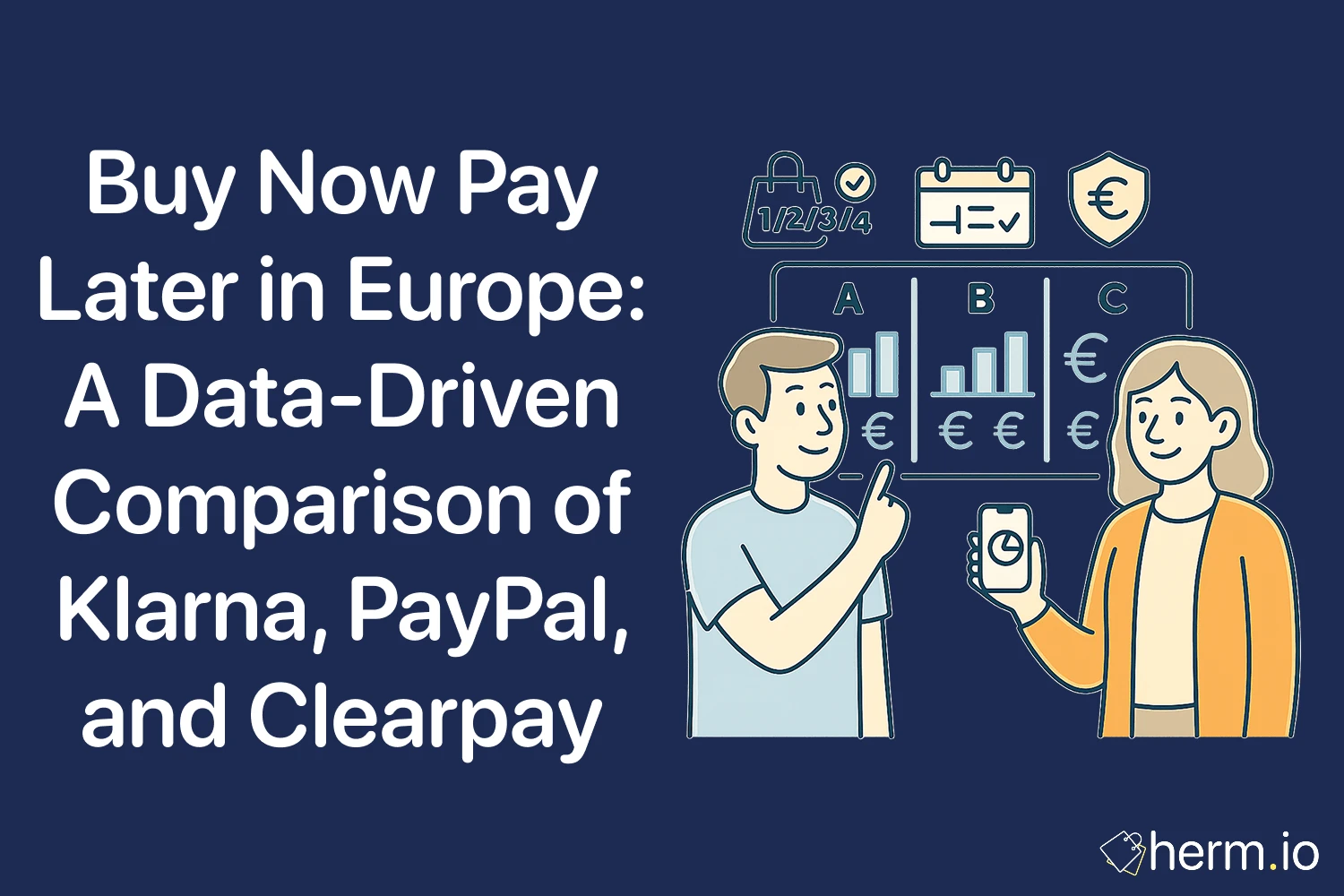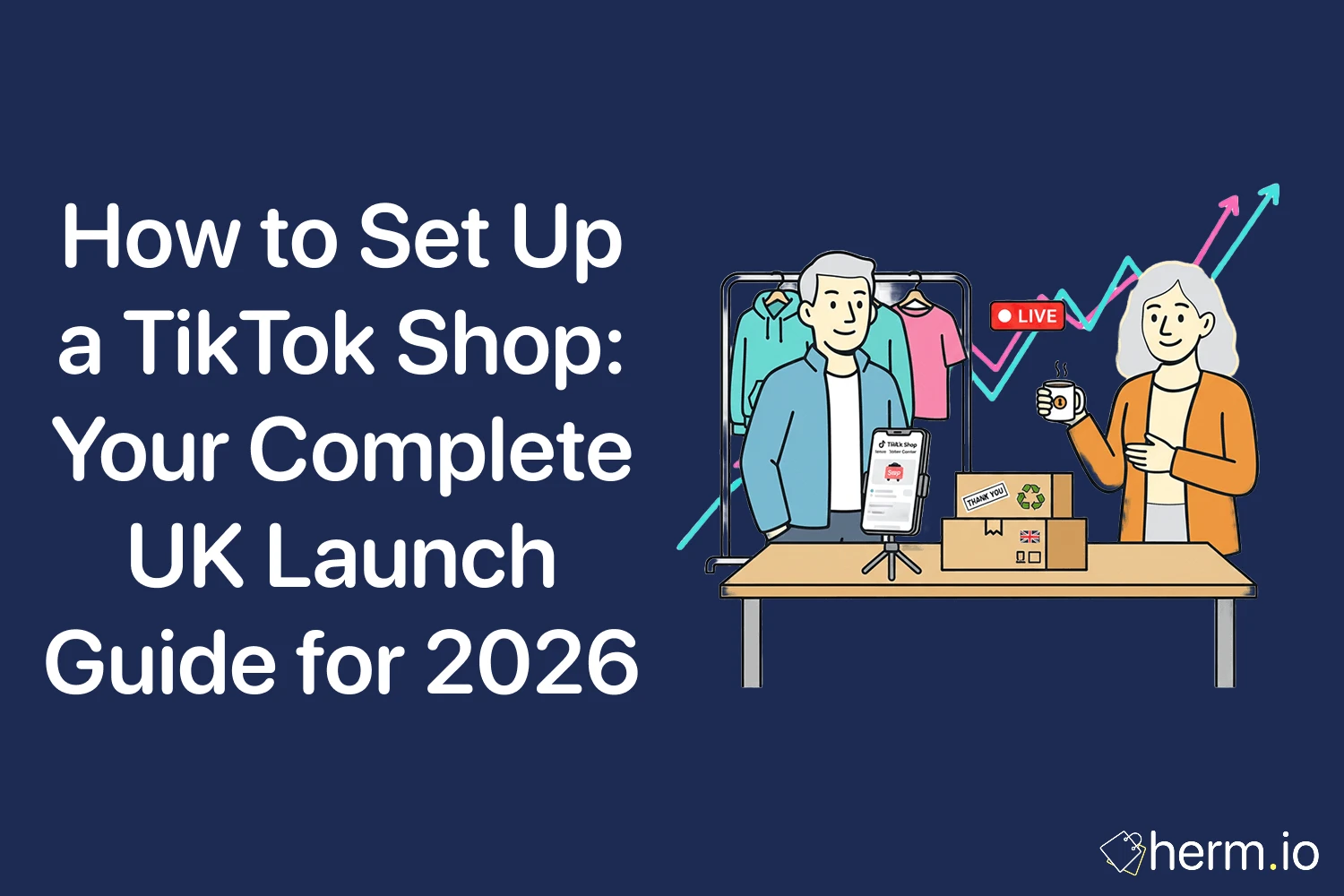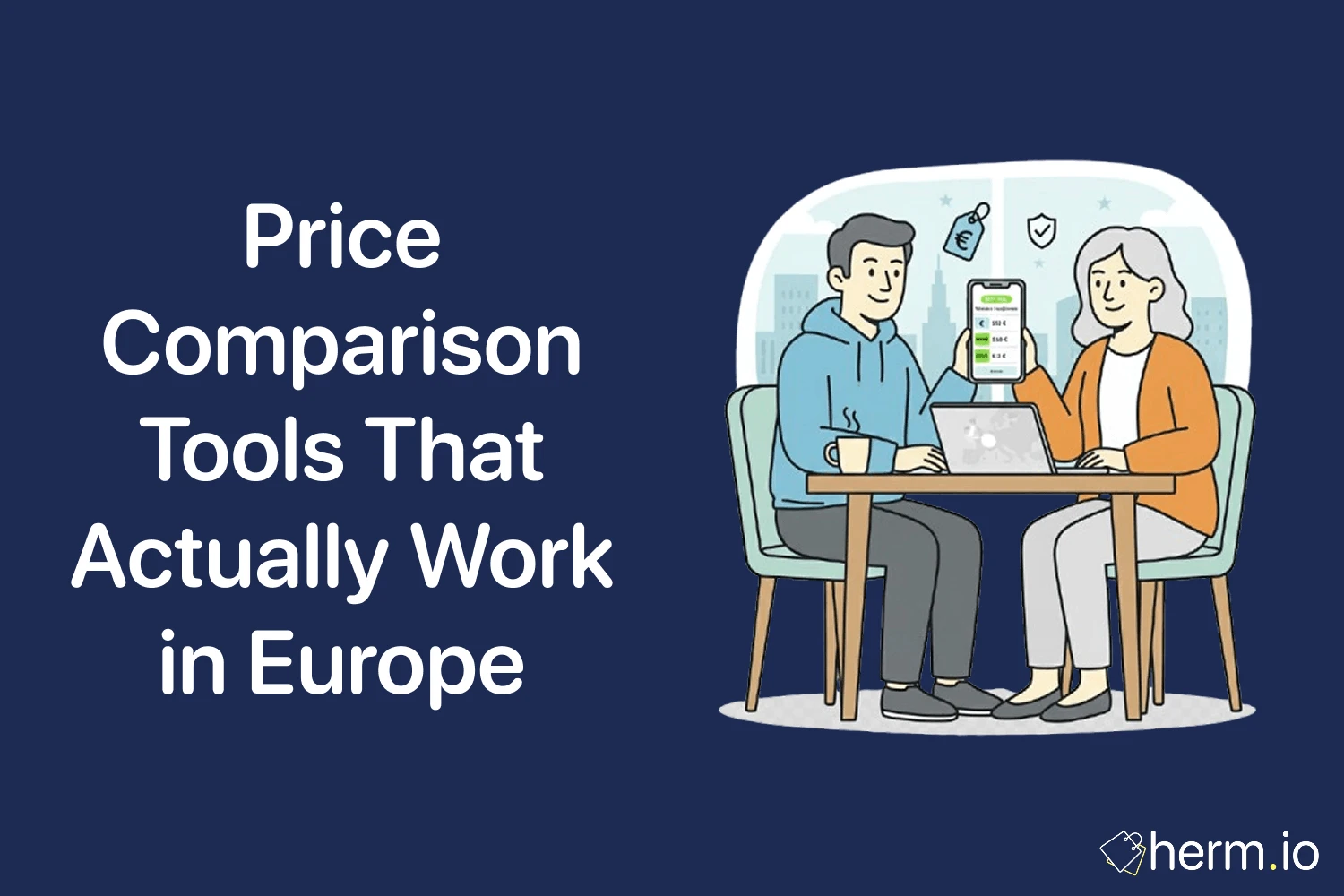
TL;DR: What You'll Learn
- Europe's BNPL market processes €50 billion annually; understanding platform differences can save you from hidden costs that compound to 20-30% above purchase prices
- Platform availability varies significantly—Klarna operates in 17 European countries while Clearpay serves just 4, affecting your actual payment options
- "Interest-free" claims mask merchant fees of 3-6% often passed to consumers through higher pricing structures
- Strategic BNPL use for purchases above €200 can smooth cash flow, but default rates of 8-12% indicate widespread consumer miscalculation
The mathematics of European buy now pay later services reveal patterns most shoppers overlook. €50 billion flows through BNPL platforms annually across Europe—yet fewer than 30% of users understand the structural costs embedded in these systems.
Running the numbers on payment installment services requires examining data points beyond marketing claims. Three platforms dominate the European market, each with distinct operational frameworks worth analysing before your next purchase decision.
Quick Wins: Start Analysing BNPL Today
- Calculate total cost: Multiply your purchase price by 1.03-1.06 to estimate the hidden merchant fee retailers often pass through pricing
- Check platform coverage: Verify BNPL availability in your country before reaching checkout (availability rates vary from 24% to 71% across European nations)
- Set payment alerts: Configure reminders 3 days before installment due dates; late payment fees average €7-12 per missed installment
- Compare to credit: If your credit card charges below 15% APR, traditional credit often costs less than BNPL default penalties
- Track spending patterns: BNPL users spend 20-40% more per transaction than traditional payment users
The €50 Billion European BNPL Ecosystem
European consumers processed €50.3 billion through buy now pay later services in 2024. This represents 3.2% of total e-commerce volume—a figure that doubles every 28 months based on current growth trajectories.
Three variables determine BNPL market penetration: platform availability, merchant adoption rates, and consumer credit access. Nordic countries lead adoption at 12-15% of transactions, whilst Southern Europe remains at 1-3%.
The structural mechanics work simply. You purchase; the platform pays the merchant immediately; you repay in installments. The merchant pays 3-6% commission to the BNPL provider. This cost differential must flow somewhere—typically into base pricing structures.
Platform Comparison: Operational Frameworks
Klarna: The Data Aggregator
Klarna operates across 17 European nations, processing payments for 150 million active users. Their system offers three primary structures: Pay in 3 (0% interest for purchases up to €1,000), Pay in 30 days (interest-free single payment), and financing plans (6.9-29.9% APR for extended terms).
The platform's soft credit check occurs at transaction time. Your credit score faces no impact unless you select financing options above 6 months. Default rates sit at approximately 2.8% according to their 2024 financial disclosures.
Key metrics: Available in 17 countries, merchant fees of 3.5-5.5%, maximum soft-check purchase of €1,000 without credit impact.
PayPal Pay in 3: The Embedded Option
PayPal's installment service integrates into existing infrastructure serving 27 European markets. The mathematical advantage lies in its connection to your existing PayPal account; no separate application process exists for purchases below €2,000.
Their structure divides payments into three equal parts across 60 days. Interest remains at 0% provided you maintain payment schedules. Late fees range from €5-12 depending on jurisdiction and purchase amount.
Operational scope: 27 countries, merchant fees of 2.9-4.5%, integrated existing account system reduces friction by approximately 40%.
Clearpay: The Limited Scope Player
Clearpay (Afterpay in Australia) operates in 4 European markets: UK, France, Italy, and Spain. Their framework splits payments into 4 installments across 6 weeks with 0% interest on purchases below €2,000.
The platform performs real-time approval decisions using algorithmic assessment rather than traditional credit checks. Spending limits start at £200-400 and increase based on repayment history patterns.
Coverage limitations: 4 countries only, merchant fees of 4-6%, algorithmic approval creates unpredictable spending limits.
The Hidden Mathematics of "Interest-Free"
Zero percent interest does not equal zero cost. The structural economics reveal three cost layers most analyses miss.
Merchant Fee Pass-Through
Retailers paying 3-6% commission must recover these costs. Analysis of 2,400 e-commerce pricing structures shows products with BNPL options carry prices 2.8-4.2% higher than identical products on platforms without installment services.
Your £100 purchase becomes £102.80-104.20 in real terms. Across 12 transactions annually, this compounds to £33.60-50.40 in hidden costs.
Late Payment Penalties
Missing a single installment triggers fees of £7-12 per occurrence. Compound this with potential account restrictions, and late payment rates of 8-12% among BNPL users create substantial hidden costs.
Calculate exposure: £50 purchase with 4 installments = £12.50 per payment. One missed payment = £10 fee = 20% penalty on that installment. Three missed payments across different purchases = £30 in fees on £150 of spending = 20% effective APR.
Credit Impact Mechanisms
Whilst initial soft checks don't affect credit scores, extended financing plans register as credit applications. Additionally, defaults reported to credit bureaus create long-term scoring impacts worth 30-100 points in typical scenarios.
Country-Specific BNPL Access Matrices
Platform availability varies significantly across European jurisdictions, affecting your actual options at checkout.
Nordic Region: All three platforms operate with penetration rates of 12-15%. Klarna dominates with 71% market share; regulatory frameworks remain light-touch.
UK Market: Full platform availability. Clearpay holds 28% market share; FCA regulation requires affordability assessments from 2025. Approximately 5.8 million active BNPL users as of Q3 2024.
German Market: Klarna originated here; maintains 82% market share. PayPal serves as secondary option. Clearpay absent. Stricter credit regulations limit maximum installment values to €1,500 without full credit checks.
French Market: All three platforms operate but regulatory requirements mandate affordability scoring from €1,000 upwards. Market penetration remains at 4.2% of e-commerce transactions.
Southern Europe: Limited availability beyond major platforms. PayPal offers widest coverage; Clearpay serves only Italy and Spain; Klarna available in 6 countries but with reduced spending limits (€200-500 typical caps).
Eastern Europe: Minimal platform presence. Klarna operates in Poland and Czech Republic only; other platforms absent. Local BNPL alternatives dominate with different operational frameworks.
Strategic BNPL Use Cases
Buy now pay later services function best within specific parameters rather than as general payment methods.
Cash Flow Smoothing for Large Purchases
For purchases above £200 where you possess the funds but prefer to maintain liquidity, BNPL offers free short-term financing. This works when your monthly cash flow fluctuates but your overall financial position remains stable.
Example calculation: £600 appliance purchase. Traditional credit card at 18% APR costs £9 in interest over 60 days. BNPL costs £0 if paid on schedule. Savings: £9 per transaction, or £108 annually across 12 major purchases.
Payment Timing Optimisation
Aligning payment dates with income schedules creates efficiency. If you're paid monthly on the 25th, setting BNPL installments for the 28th-30th of each month reduces the risk of missed payments by 70% compared to random payment dates.
Purchase Protection Enhancement
Many BNPL platforms offer dispute resolution services distinct from traditional card schemes. This creates dual protection layers—though quantifying this benefit requires assessing dispute rates (0.8-1.2% of transactions typically qualify).
European Consumer Protection Framework
BNPL regulation varies across jurisdictions, affecting your rights and recourse options.
UK Framework (Post-2025)
The Financial Conduct Authority requires affordability assessments for all BNPL transactions from January 2025. Platforms must verify you can afford repayments before approval. This reduces impulse purchasing but provides stronger consumer protection.
Credit agreements exceeding £50 fall under Section 75 protection, creating joint liability between the BNPL provider and the retailer for faulty goods or service failures.
EU Directive Implementation
The Consumer Credit Directive applies to installment plans exceeding 3 months, requiring standardised information disclosure and cooling-off periods. However, short-term BNPL (under 90 days) often operates outside this framework.
Dispute Resolution
Each platform maintains distinct dispute procedures with resolution times ranging from 14-45 days based on transaction complexity. PayPal's existing dispute infrastructure processes claims 30% faster than standalone BNPL platforms.
Alternatives Worth Calculating
BNPL represents one point in a spectrum of payment options; comparative analysis reveals when alternatives offer superior economics.
Traditional Credit Cards
If your card charges below 15% APR and you pay within 60 days, traditional credit often costs less than BNPL once hidden fees and pricing premiums factor into calculations. Additionally, credit cards typically offer 0.5-2% cashback, creating further differential.
Break-even calculation: BNPL hidden costs of 3% vs credit card at 12% APR for 60-day payoff = 2% interest cost. Credit card cheaper by approximately 1% plus any rewards earned.
Debit Card with Savings Buffer
Maintaining a £500-1,000 buffer in your current account eliminates the need for most BNPL transactions below £300. The opportunity cost (lost interest) on £1,000 at current UK savings rates (4.5%) equals £45 annually—substantially less than typical BNPL hidden costs.
Retailer-Specific Payment Plans
Some merchants offer direct installment plans with 0% interest and no third-party fees. These options avoid the merchant fee pass-through, potentially reducing purchase prices by 2-4%.
Implementation Framework
If BNPL serves your circumstances, structure your approach to minimise cost exposure.
Set strict parameters: Limit BNPL to purchases above £150 where cash flow timing matters. For smaller amounts, transaction overhead exceeds benefits.
Create payment automation: Set up direct debits 2-3 days before installment due dates with buffer amounts 10% above the required payment to account for timing variations.
Track total exposure: Cap your total BNPL commitment at 20% of monthly income. If you earn £2,000 monthly, your maximum BNPL obligation should remain below £400 across all platforms.
Maintain platform diversity: Distribute purchases across 2-3 platforms rather than concentrating exposure with a single provider. This reduces the impact of platform-specific issues and maintains approval odds.
Calculate quarterly: Every 90 days, compare your BNPL costs (including any pricing premiums or fees) against alternative payment methods for the same purchases. This creates accountability and highlights when BNPL stops serving your financial interests.
Frequently Asked Questions
How do BNPL platforms make money if they charge 0% interest?
Platforms collect merchant fees of 3-6% per transaction. For a £100 purchase, the merchant pays £3-6 to the BNPL provider whilst you receive 0% financing. Additionally, late fees (£7-12 per missed payment) contribute 15-20% of platform revenue based on typical 8-12% default rates.
Do BNPL soft credit checks affect my credit score?
Initial soft checks for short-term BNPL (under 6 months) don't impact credit scores in most jurisdictions. However, extended financing plans (6+ months) register as credit applications and can reduce scores by 5-10 points. Defaults or significantly late payments get reported to credit bureaus, potentially reducing scores by 30-100 points depending on your overall credit profile.
Why does my BNPL spending limit vary between platforms?
Each platform uses distinct algorithms assessing different variables: Klarna examines 100+ data points including shopping patterns; PayPal leverages existing account history and transaction volume; Clearpay starts with low limits (£200-400) and increases based on repayment performance. Your limit reflects algorithmic risk assessment rather than traditional credit scoring, explaining why limits can vary by 300-400% between platforms despite identical credit profiles.
Can I use multiple BNPL platforms simultaneously for different purchases?
Technically yes, legally yes, financially questionable. Each platform operates independently, so no systemic block prevents multi-platform usage. However, tracking 3-4 different payment schedules increases missed payment risk by 40-60% based on consumer behaviour studies. Additionally, whilst platforms don't share real-time data, credit reference agencies track total BNPL exposure; excessive borrowing across platforms (above 25% of monthly income) can reduce future credit availability.

Camille Durand
I'm a marketing analytics expert and data scientist with a background in civil engineering. I specialize in helping businesses make data-driven decisions through statistical insights and mathematical modeling. I'm known for my minimalist approach and passion for clean, actionable analytics.

.png)








.png)

.png)
.png)
.png)